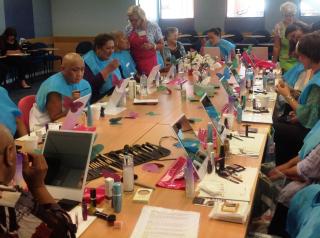- Home
- News
- Screening Matters, Issue 51, April 2015
- Look Good Feel Better classes a big hit
News
- Screening Matters Newsletter
- April 2019
- April 2018
- December 2017
- August 2017
- April 2017
- December 2016
- October 2016
- March 2016
- November 2015
- August 2015
- June 2015
- April 2015
- February 2015
- December 2014
- October 2014
- August 2014
- June 2014
- April 2014
- February 2014
- December 2013
- October 2013
- August 2013
- June 2013
- April 2013
- February 2013
Screening Matters
The National Screening Unit newsletter
Look Good Feel Better classes a big hit

Look Good Feel Better workshops are free for women undergoing treatment for any type of cancer. Participants are guided by a trained volunteer on how to cope with things like dry, flaking skin and pigmentation changes. They are taken through a skin care and make-up regime and given guidance on how to apply cosmetics to help camouflage loss of eyebrows, eyelashes and skin colour fluctuations. They are also given products to take home.
The workshops are held monthly at 31 centres throughout New Zealand, but Look Good Feel Better General Manager Clare O’Higgins says it’s been difficult to get Māori and Pacific women to the Auckland workshops.
‘We weren’t getting the numbers that we knew about through diagnosis statistics, and it’s also our aim that no woman should have to travel more than 30 minutes from home to attend a workshop. We were really keen to hold workshops in South Auckland that were not only convenient for women from that area, but culturally appropriate, to encourage Māori women to attend.’
Since late last year BreastScreen Counties Manukau (BSCM) has liaised with Look Good Feel Better to hold the monthly workshops and supplied a room for them at the Counties Manukau District Health Board’s Manukau Super Clinic. The workshops are also promoted to women diagnosed with breast cancer through BSCM.
Clare also approached Raukura Hauora O Tainui kaiwhakahaere (administrators) Marama Piripi and Heather Emery about making the workshops more culturally appropriate for Māori women. Raukura Hauora O Tainui has contracts for both breast and cervical screening for a large area of central and South Auckland.
Using tikanga Māori, Marama and Heather helped Look Good Feel Better adapt the highly successful workshop model that has operated internationally for 25 years, and used their networks to encourage Māori women to attend.
The workshops begin with a karakia and feature waiata. ‘We enjoy being able to show our support for the women through manaaki or hospitality, providing kai and korero,’ says Heather.
‘Bringing these cultural aspects to the workshops encourages the women to open up. They don’t know each other when they arrive, but by the end of the workshop they’re swapping phone numbers and organising to support each other.’
‘A lot comes out,’ agrees Marama. ‘Some of the women are very whakamā and hold back. ‘But afterwards, they’ll often come up to us individually to have a talk about their cancer journey.’
Clare says it’s very important for the volunteers working with each participant to understand Māori protocols, particularly around things like touching the head. The tutor for the South Auckland workshops also made the decision to learn Māori.
‘It’s really important that we run our programme in a way that reflects the communities in which we operate, and give every woman undergoing cancer treatment the same opportunity to benefit from the workshops.
‘We’re a very important part of a woman’s non-medical cancer treatment. We aim to give them back a sense of who they are and some control at a time when so much of what is happening to them is outside their control. One participant described the workshop as helping her ignite her spirit.
‘We encourage any health worker to refer women to the programme or, as is the case in South Auckland, work with us to set up a programme to meet the needs of a particular community.’
Look Good Feel Better is about to begin holding workshops adapted for Pacific women in West Auckland in conjunction with Pacific Health provider, West Fono.
To receive the Screening Matters newsletter by email, fill out our sign-up form.

